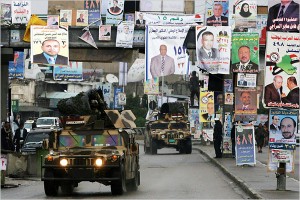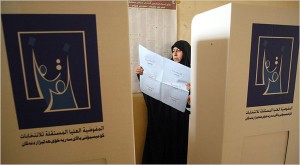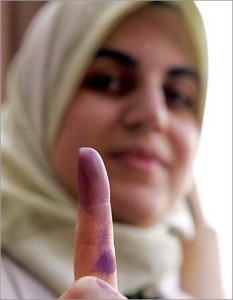An article that’s worth discussing is Fukuyama’s What Became of the Freedom Agenda?. It’s based on a United States Institute of Peace working paper which was released on January 21.
Fukuyama withdrew his support for the war in Iraq as soon as things became difficult, yet at the same time he continues to acknowledge the reality that the US can’t afford to keep cozying up to the autocratic regimes in the Middle East.
He manages to quote Bush (2003) with approval:
“Sixty years of Western nations excusing and accommodating the lack of freedom . . . did nothing to make us safe. . . . As long as the Middle East remains a place where freedom does not flourish, it will remain a place of stagnation, resentment and violence ready for export.”
But he continues to oppose what he calls ” return(ing) to the loud trumpeting of promises for support of regional democracy that we cannot keep” and ignores the fact that in Iraq, the US has kept exactly that promise. Instead he tries to argue that the overhrow of Baathism in Iraq can only be seen as a setback for “democracy promotion” because it “undercut (the) credibility” of that policy, and in his view increased Arab hostility toward America.
He rightly points to the way in which the autocrats of the region continue to get away with justifying the repression of opposition groups by saying that this is necessary to keep militant Islamists out of power and then goes on to call on Obama to “recommit the United States to peaceful democratic change”
What he wants the US to do now is to follow a policy of “working quietly behind the scenes to push friendly authoritarians towards a genuine broadening of political space in their countries through the repeal of countless exceptional laws, defamation codes, party registration statutes and the like that hinder the emergence of real democratic contestation.”
The article is quite extraordinary in the way it makes no attempt to analyse the impact of the changes in Iraq, apart from maintaining that it damaged US credibility in the region. I don’t know how anyone can purport to be writing a serious article about the prospects for democratic change in the Middle East, without writing in some detail about the one country in which democratic change has actually happened! The thing which will do most to force (not gently “push”) the autocrats of the region out of power, is the move from fascism to democracy in Iraq. Fukuyama may disagree with that, but he doesn’t even address the issue.










Recent Comments